I am not a literary critic. I am a historian who really loves reading (and writing) books. This is an important thing to know going into this.
Outside of my academic work, in which I read lots of very intensely violent and depressing things, I exclusively read fiction and/or personal essays because otherwise I truly do think my soul would just shrivel up and cease existing. This year, I read 22 nonacademic books - leisurely in some cases and hungrily in others. I also read probably 30-40 disgusting romance novels but we don’t need to talk about those.
Approximately three years ago I began to take a pen and compulsively label books upon my completion of them. The label is simple, and is written in the top righthand corner of one of the book’s first few pages. It consists of three parts:
Month/year it was read (July 2023, for example)
All the places it was read (on the beach at Point Reyes, for example)
Any other information of note
This sort of ritualistic labeling transforms these books from objects with which I have interacted and from which I have extracted some understanding of the world and into self-contained markers of experience. They are transformed into archival objects.
When I look back at a book I’ve read, I know lots of things before I even get to the title page. I know when I read it and where I read it, and can through that information create a context for its reading that tells me something both about the book and about my past self.
In essence, I took the recent trend of ‘romanticizing ones life’ and one-upped it — I historicized mine.
There are people throughout history who have collected quite a lot of books - Pamphilus of Caesarea, Cassiodorus, George Washington, and William Randolph Hearst all spring to mind. But my experience of scrawling a time and place onto a dedication page is not about the volume of my collection. It’s not even really about proving my consumption of knowledge.
I spend quite a lot of my life discussing the merits of material history and at some point I must have absorbed my own lectures, because I think this practice is about forcing a book to act as a portal to its own past.
When I teach classes on things like the Oneg Shabbat/Ringelblum Archives of the Warsaw Ghetto, I always ask students why they think someone facing such unimaginable horror would risk their lives to save sheet music and children’s drawings. Invariably, after only a few minutes of brainstorming they return to me with an answer: to believe that the quotidian objects of your world are worth saving is to believe that you are worth knowing about. The impulse to archive, to locate yourself in time, is born of the conviction that your existence in the world matters in even the smallest of respects. This historicization is actually a call to the void and an assertion of value.
To say, even accidentally, that the time and place you lived in - the objects you used - the context in which you used them - matter is to weave yourself into the tapestry of the world. We have been doing that for thousands of years, and it’s why we know that people like the Sumerian scribe Gar.Ama. existed in 3100 BCE.
So here I am, in all my hubris, saying that all the Mes of 2024 were worth remembering, if only by myself. See books and relevant archival information below.
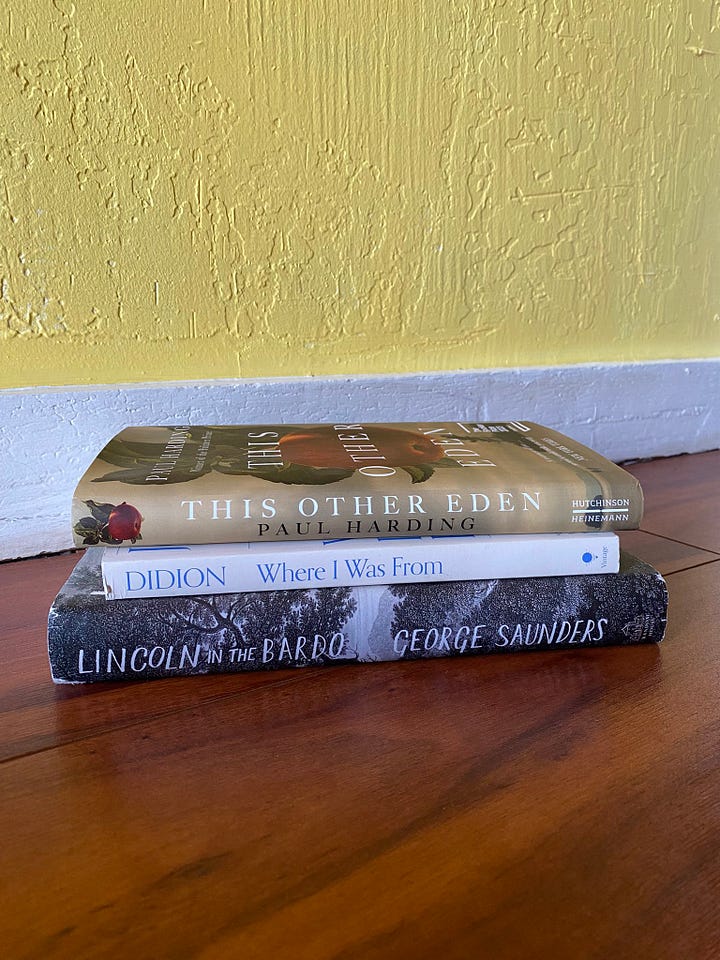
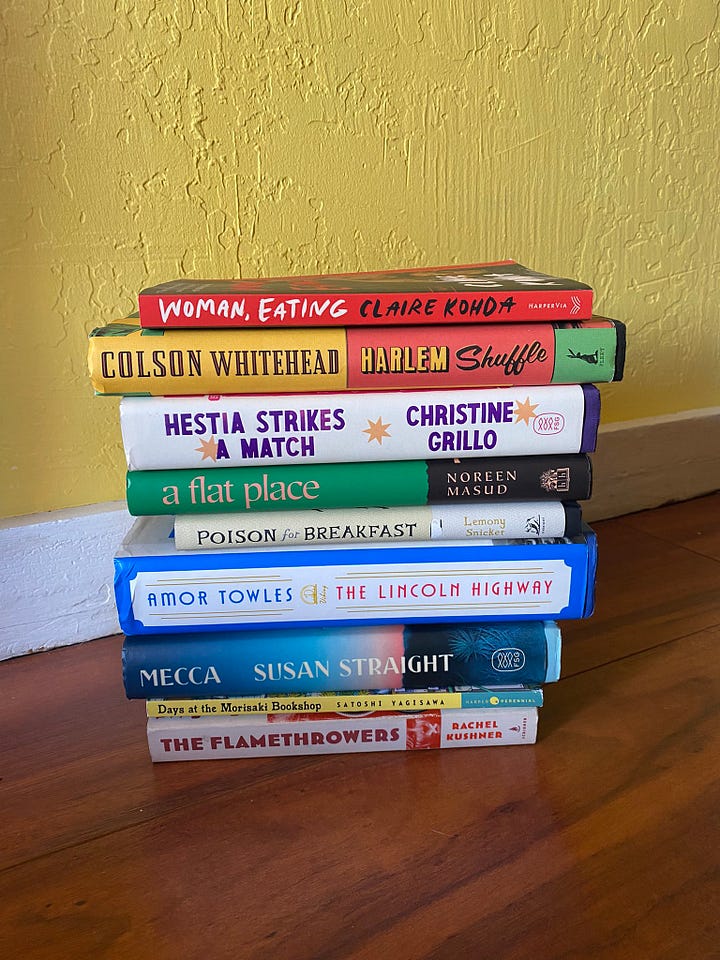
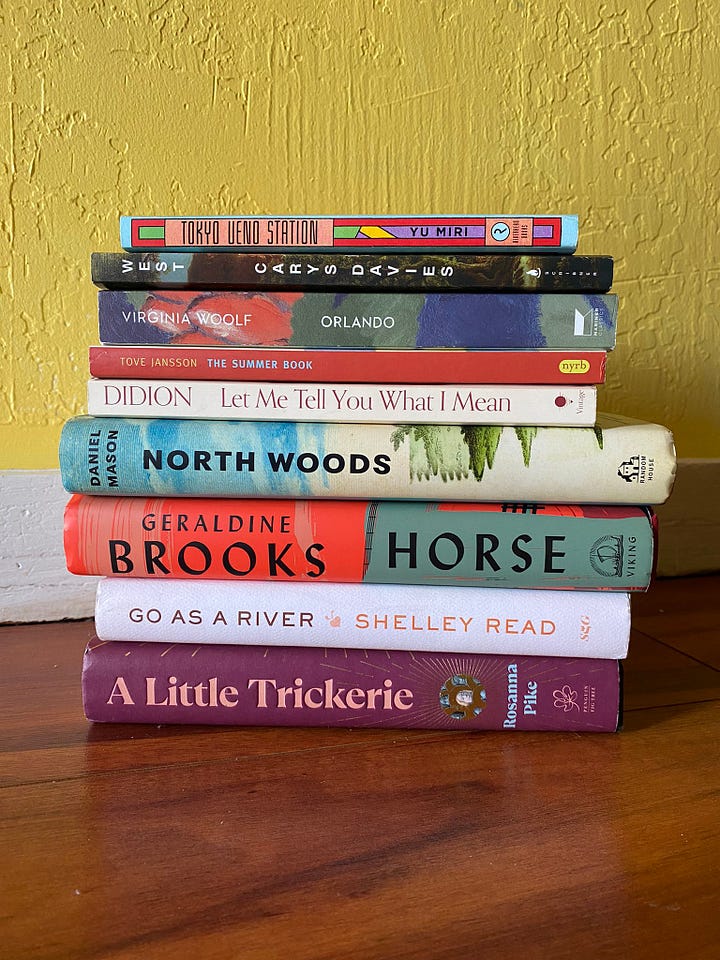
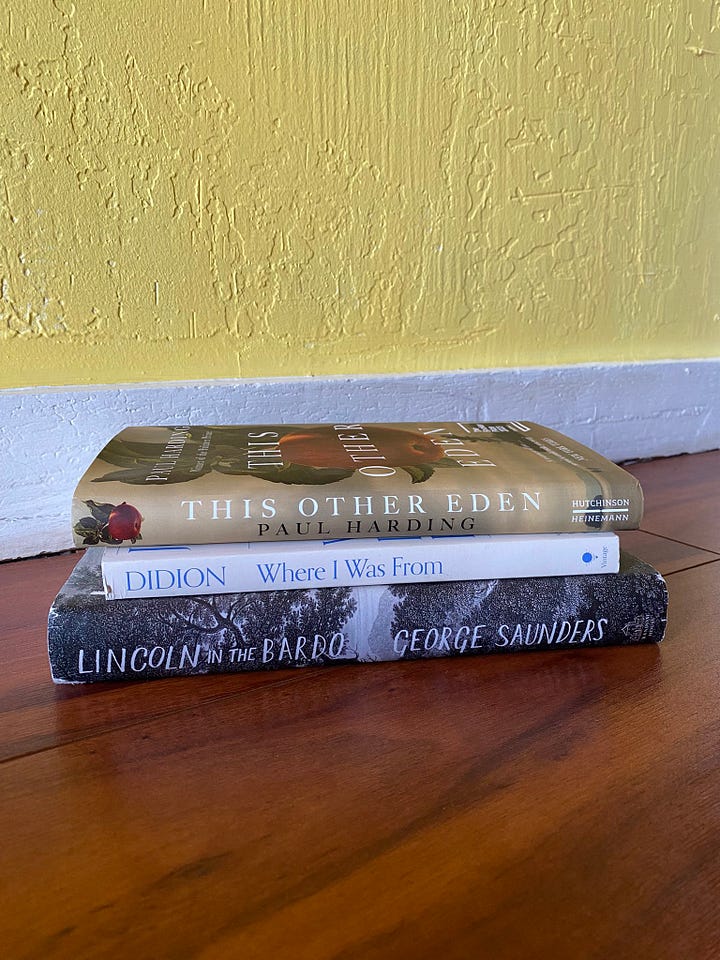
WINTER
3 books. I had just begun teaching at a new university and I was extraordinarily preoccupied with Doing A Good Job, pastimes be damned!
This Other Eden by Paul Harding
January.
At home.
Book purchased in Edinburgh the previous month.
Where I Was From by Joan Didion
February-March.
Shore of Lake Tahoe, At home, Portland.
Lincoln in the Bardo by George Saunders
December 2023, January and March and April 2024.
At home.
Smells like the tomato plants on my back deck.
SPRING
9 books. More teaching, but also - crucially - Spring Break, which brought with it a road trip to the Pacific Northwest to see loved ones and meet their very important babies.
Woman, Eating by Claire Kohda
March.
Olympia, Portland, somewhere on I-5 in Northern California.
Harlem Shuffle by Colson Whitehead
March-April.
At home.
Signed copy, purchased in Edinburgh upon release in August 2021.
Hestia Strikes A Match by Christine Grillo
March-April.
Portland, at home.
A Flat Place by Noreen Masud
April.
Humboldt Redwoods.
Ashy fingerprints on some of the pages.
Poison for Breakfast by Lemony Snicket
April.
At home, on the front porch.
All in one go.
The Lincoln Highway by Amor Towles
April-May.
At home, in the airport, and in Loveland, Colorado.
Plucked from a Little Free Library mid-run and carried for three miles.
Mecca by Susan Straight
April-May.
Humboldt Redwoods, lying in the sun at home.
Days at the Morisaki Bookshop by Satoshi Yagisawa (trans. Eric Ozawa)
May.
At home alone one evening.
The Flamethrowers by Rachel Kushner
May-June.
At home.
SUMMER
9 books. Not teaching, recovering from an unbelievable case of burnout and walking around 10 miles per day. Road trip through Nevada, Utah, and Arizona and ten days in Scotland to help my best friend get married to the love of her life.
Tokyo Ueno Station by Yu Miri
June.
Bolinas Beach.
Sand falls out of the spine if you shake it.
Orlando by Virginia Woolf
June-July.
At home.
A little on the porch, a little on the couch. A little in the bath.
West by Carys Davies
July.
I-50 in the Nevada desert, Wheeler Peak at Great Basin National Park.
The Summer Book by Tove Jansson (trans. Thomas Teal)
July.
Wheeler Peak at Great Basin National Park.
In a hammock, getting a sunburn.
Let Me Tell You What I Mean by Joan Didion
July.
Wheeler Peak at Great Basin National Park.
Meadow full of deer and wildflowers.
North Woods by Daniel Mason
July.
Wheeler Peak at Great Basin National Park.
Sometimes in the daylight, sometimes by the fire, dusk approaching.
Horse by Geraldine Brooks
July.
Cliff overlooking Coconino National Forest.
Go As A River by Shelley Read
July.
Coconino National Forest.
Thunderstorm outside.
A Little Trickerie by Rosanna Pike
August-September.
Edinburgh, Forgandenny in the Ochils, Bolinas, at home.
Smells of the wood-burning fireplace in my best friend’s library.
FALL
2 books. Working two jobs, reading too many romance novels. Feeling bad (but not that bad) about it.
Very Cold People by Sarah Manguso
September-October.
At home, on the couch.
The Glutton by A.K. Blakemore
October.
At home.
Until late at night, candle burned to a stub.


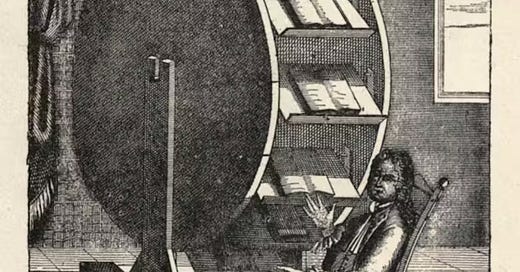



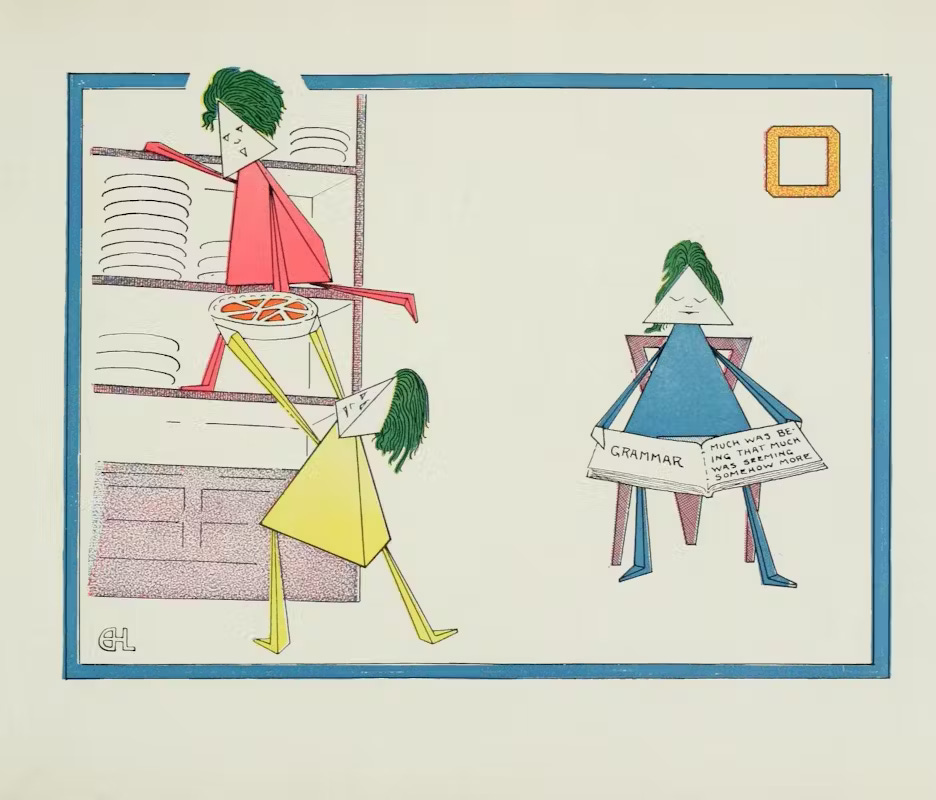
I love your inclusion of places you've read and where you got your books! It's too late for me as I've gone through and donated so many books over my lifetime, many of them library rentals, not to be written in. Keep up the good work Dr. Aubin!
"I also read probably 30-40 disgusting romance novels but we don’t need to talk about those." We could, though :) Honestly, I could use some recs.
I've long felt there was something deeply narcissistic about writing, and even moreso about publishing. Not in a bad way. What a perfect articulation of this idea: To write, also, is "to believe that you are worth knowing about." Yes, it me.